 W
WAppalachia is a cultural region in the Eastern United States that stretches from the Southern Tier of New York State to northern Alabama and Georgia. While the Appalachian Mountains stretch from Belle Isle in Canada to Cheaha Mountain in Alabama, the cultural region of Appalachia typically refers only to the central and southern portions of the range, from the Blue Ridge Mountains of Virginia, southwesterly to the Great Smoky Mountains. As of the 2010 United States Census, the region was home to approximately 25 million people.
 W
WAmerican fiddle-playing began with the early settlers who found that the small viol family instruments were portable and rugged. According to Ron Yule, "John Utie, a 1620 immigrant, settled in the North and is credited as being the first known fiddler on American soil". Early influences were Irish fiddle styles as well as Scottish and the more refined traditions of classical violin playing. Popular tunes included "Soldier's Joy", for which Robert Burns had written lyrics, and other such tunes as "Flowers of Edinburgh" and "Tamlin," which were claimed by both Scottish and Irish lineages.
 W
WAppalachia Waltz is the first album from the trio of cellist Yo-Yo Ma, double-bassist and composer Edgar Meyer, and fiddler and composer Mark O'Connor. Sony Classical released the disc in 1996. It was recorded over three days, 14 August-17 August 1995.
 W
WThe Appalachian dulcimer is a fretted string instrument of the zither family, typically with three or four strings, originally played in the Appalachian region of the United States. The body extends the length of the fingerboard, and its fretting is generally diatonic.
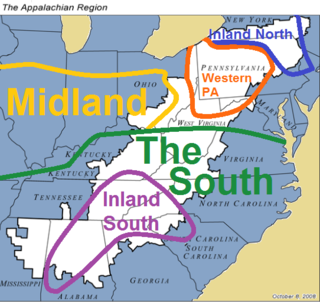 W
WAppalachian English is American English native to the Appalachian mountain region of the Eastern United States. Historically, the term "Appalachian dialect" refers to a local English variety of southern Appalachia, also known as Smoky Mountain English or Southern Mountain English in the United States, both influential upon and influenced by the Southern U.S. regional dialect, which has become predominant in central and southern Appalachia today, while a Western Pennsylvania regional dialect has become predominant in northern Appalachia. The 2006 Atlas of North American English identifies the "Inland South,” a dialect sub-region in which the Southern U.S. dialect's defining vowel shift is the most developed, as centering squarely in southern Appalachia: namely, the cities of Knoxville and Chattanooga, Tennessee; Birmingham, Alabama; and Asheville, North Carolina. All Appalachian English is rhotic and characterized by distinct phonology, morphology, syntax, and lexicon. It is mostly oral but its features are also sometimes represented in literary works.
 W
WAppalachian Journey is the second album from the string trio of bassist and composer Edgar Meyer, fiddler and composer Mark O'Connor, and cellist Yo-Yo Ma. James Taylor and Alison Krauss join the trio individually on two Stephen Foster songs arranged for the trio. Sony Classical released the disc in 2000. The album joined a number of other recordings released since Appalachia Waltz that continue a new kind of classical music tinged with and influenced by the sounds and structures of America's own musical traditions. It is possible that the titles of these albums imply a continuity of the American classical tradition begun by Aaron Copland in Appalachian Spring. Unlike their first album, the three virtuosos spent several months on the compositions and arrangements, from July 19 to September 10, 1999.
 W
WThe Appalachian Mountains, often called the Appalachians, are a system of mountains in eastern North America. The Appalachians first formed roughly 480 million years ago during the Ordovician Period. They once reached elevations similar to those of the Alps and the Rocky Mountains before experiencing natural erosion. The Appalachian chain is a barrier to east–west travel, as it forms a series of alternating ridgelines and valleys oriented in opposition to most highways and railroads running east–west.
 W
WApple butter is a highly concentrated form of apple sauce produced by long, slow cooking of apples with cider or water to a point where the sugar in the apples caramelizes, turning the apple butter a deep brown. The concentration of sugar gives apple butter a much longer shelf life as a preserve than apple sauce.
 W
WBack Roads to Cold Mountain is a 2004 compilation album released by Smithsonian Folkways. The album was released in the wake of the award-winning soundtrack to the film Cold Mountain, and is composed of Appalachian folk music recordings compiled by musicologist John Cohen in Appalachia.
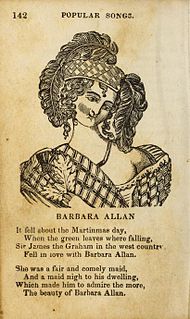 W
W"Barbara Allen" is a traditional Scottish ballad; it later travelled to America both orally and in print, where it became a popular folk song. Ethnomusicologists Steve Roud and Julia Bishop described it as "far and away the most widely collected song in the English language—equally popular in England, Scotland and Ireland, and with hundreds of versions collected over the years in North America."
 W
WBlue Ridge is a brand and range of American tableware (dishware) manufactured by Southern Potteries Incorporated from the 1930s until 1957. Well known in their day for their underglaze decoration and colorful patterns, Blue Ridge pieces are now popular items with collectors of antique dishware. The underglaze technique made the decorations more durable, and while basic patterns were reused consistently, the fact that each piece was hand-painted means that no two pieces are exactly alike.
 W
WThe Blue Ridge Mountains are a physiographic province of the larger Appalachian Mountains range. The mountain range is located in the eastern United States, and extends 550 miles southwest from southern Pennsylvania through Maryland, West Virginia, Virginia, North Carolina, South Carolina, Tennessee, and Georgia. This province consists of northern and southern physiographic regions, which divide near the Roanoke River gap. To the west of the Blue Ridge, between it and the bulk of the Appalachians, lies the Great Appalachian Valley, bordered on the west by the Ridge and Valley province of the Appalachian range.
 W
WThe Blue Ridge Parkway is a National Parkway and All-American Road in the United States, noted for its scenic beauty. The parkway, which is America's longest linear park, runs for 469 miles (755 km) through 29 Virginia and North Carolina counties, linking Shenandoah National Park to Great Smoky Mountains National Park. It runs mostly along the spine of the Blue Ridge, a major mountain chain that is part of the Appalachian Mountains. Its southern terminus is at U.S. Route 441 (US 441) on the boundary between Great Smoky Mountains National Park and the Cherokee Indian Reservation in North Carolina, from which it travels north to Shenandoah National Park in Virginia. The roadway continues through Shenandoah as Skyline Drive, a similar scenic road which is managed by a different National Park Service unit. Both Skyline Drive and the Virginia portion of the Blue Ridge Parkway are part of Virginia State Route 48 (SR 48), though this designation is not signed.
 W
WCabbagetown is an intown neighborhood on the east side of Atlanta, Georgia, United States, abutting historic Oakland Cemetery. It includes the Cabbagetown District, a historic district listed on the U.S. National Register of Historic Places.
 W
WMoses Herman Cone was an American textile entrepreneur, conservationist, and philanthropist of the Gilded Age who was active in the southern United States. He began his career in sales and became an innovator who offered finished clothing, which was unusual in an era when textiles were normally sold as unfinished cloth.
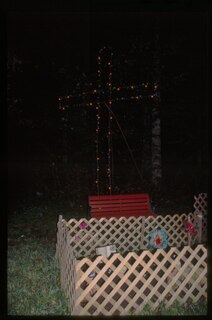 W
WDecoration Days in Southern Appalachia and Liberia are a living tradition of group ancestor veneration observances which arose by the 19th century. While Decoration practices are localized and can be unique to individual families, cemeteries, and communities, common elements unify the various Decoration Day practices and are thought to represent syncretism of Christian cultures in 19th century Southern Appalachia with pre-Christian influences from the British Isles and Africa. Appalachian and Liberian cemetery decoration traditions pre-date the United States Memorial Day holiday.
 W
WThe Florence Y'all Water Tower is a water tower owned by the city of Florence, Kentucky, United States. It stands between the Florence Mall and interstate highways 75 and 71, where it is seen by millions of interstate motorists annually. The 1974 tower, originally painted with the words FLORENCE MALL in giant letters, became a regional landmark after the M was changed to Y' to address legal concerns.
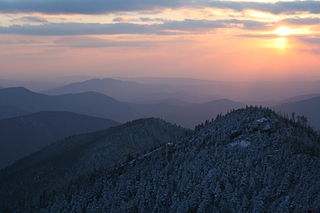 W
WThe Great Smoky Mountains are a mountain range rising along the Tennessee–North Carolina border in the southeastern United States. They are a subrange of the Appalachian Mountains, and form part of the Blue Ridge Physiographic Province. The range is sometimes called the Smoky Mountains and the name is commonly shortened to the Smokies. The Great Smokies are best known as the home of the Great Smoky Mountains National Park, which protects most of the range. The park was established in 1934, and, with over 11 million visits per year, it is the most visited national park in the United States.
 W
WGregory Bald is a mountain in the Great Smoky Mountains. It has an elevation of 4,949 feet above sea level. The mountain's majestic summit makes it a popular hiking destination. Another feature that attracts many visitors are the flame azaleas that bloom over the bald every summer. The azaleas reach peak bloom around mid-to-late June.
 W
WThomas Spottswood Hinde was an American newspaper editor, opponent of slavery, author, historian, real estate investor, Methodist minister and a founder of the city of Mount Carmel, Illinois. Members of the Hinde family were prominent in Virginia, Kentucky, Ohio, and Illinois. His sons Charles T. Hinde became a shipping magnate and Edmund C. Hinde an adventurer. He was the father-in-law of judge Charles H. Constable.
 W
WThe Hutong Yellow Weasels are a Beijing-based traditional American string band, notable for being the first band to tour throughout China introducing square dance music to the Chinese public. Founded in Beijing in 2011 by Chris Hawke and Kirk Kenney, the band incorporates a rotating cast of expat musicians to increase their numbers during live shows, and plays traditional American pre-war Appalachian folk music. Chinese square dancing clubs, using recorded music and catering to elderly Chinese, have existed in Beijing for at least a decade. However, the first time members of these clubs heard live square dancing music was in November 2012 when the Weasels and visiting old time fiddler Michael Ismerio toured through universities, nightclubs and festivals throughout China. The tour took the band through Beijing, Shanghai, Suzhou, Hangzhou, Dali, Xinsheng, Xian, and Guizhou. As of 2015, the band was touring and holding square dances around the country, exposing many Chinese people to traditional instruments like the banjo and mandolin, and traditional Appalachian music for the first time.
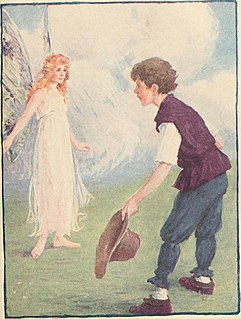 W
WJack is an archetypal Cornish and English hero and stock character appearing in legends, fairy tales, and nursery rhymes,
 W
WThe Jew's harp, also known as jaw harp, mouth harp, gewgaw, guimbard, khomus, trump, Ozark harp, Galician harp, or murchunga, is a lamellophone instrument, consisting of a flexible metal or bamboo tongue or reed attached to a frame.
 W
WJig dolls are traditional wooden or tin-plate toys for adults or children. They are dolls with loose limbs that step dance or 'jig' on the end of a vibrating board or platform in imitation of a real step dancer. In London they were frequently operated by street entertainers or buskers. In England old soldiers from the Great War sometimes busked with them to supplement their meagre war pensions. Typically the dolls are between 20–30 cm (8–10 in) tall and are jointed at arms, hips and knees; some also have ankle joints. Today, jig dolls of one kind or another can be seen in the USA, Canada, the UK, Ireland, Europe, parts of Asia, and Australia.
 W
WMatewan is a town in Mingo County, West Virginia, USA at the confluence of the Tug Fork River and Mate Creek. The population was 499 at the 2010 census. The Norfolk Southern Railway's Pocahontas District runs through the town.
 W
WMoonshine is referenced in many works, including books, motion pictures, musical lyrics and television.
 W
WMountain whites were usually poor whites living in the Southern United States in Pre-Civil War America. They were generally small farmers, who inhabited the valleys of the Appalachian range from western Virginia to northern Georgia and Alabama.
 W
WThe musical bow is a simple string instrument used by a number of South African peoples, which is also found in the Americas via slave trade. It consists of a flexible, usually wooden, stick 1.5 to 10 feet long, and strung end to end with a taut cord, usually metal. It can be played with the hands or a wooden stick or branch. It is uncertain if the musical bow developed from the hunting bow, though the San or Bushmen people of the Kalahari Desert do convert their hunting bows to musical use.
 W
WOld time fiddle is a genre of American folk music. "Old time fiddle tunes" derived from European folk dance tunes such as Jig, Reel, Breakdown, Schottische, Waltz, Two Step and Polka. The fiddle may be accompanied by banjo or other instruments but are nevertheless called "fiddle tunes". The genre traces from the colonization of North America by immigrants from England, France, Germany, Ireland, and Scotland. It is separate and distinct from traditions which it has influenced or which may in part have evolved from it, such as bluegrass, country blues, variants of western swing and country rock.
 W
WJean Ruth Ritchie was an American folk singer, songwriter, and Appalachian dulcimer player, called by some the "Mother of Folk". In her youth she learned hundreds of folk songs in the traditional way, many of which were Appalachian variants of centuries old British and Irish songs, including dozens of Child Ballads. In adulthood, she shared these songs with wide audiences, as well as writing some of her own songs using traditional foundations. She is ultimately responsible for the revival of the Appalachian dulcimer, the traditional instrument of her community, which she popularized by playing the instrument on her albums and writing tutorial books. She also spent time collecting folk music in the United States and in Britain and Ireland, in order to research the origins of her family songs and help preserve traditional music. She inspired a wide array of musicians, including Bob Dylan, Joan Baez, Shirley Collins, Joni Mitchell, Emmylou Harris and Judy Collins.
 W
WRoan Mountain is the highpoint of the Unaka Range of the Southern Appalachian Mountains, located in the Southeastern United States. The mountain is clad in a dense stand of Southern Appalachian spruce-fir forest, and includes the world's largest natural rhododendron garden, and the longest stretch of grassy bald in the Appalachian range. The Cherokee National Forest and Pisgah National Forest converge atop the mountain, with Roan Mountain State Park located near its northern base. The Appalachian Trail traverses most of the Roan's crest. The Roan High Knob Shelter is the highest back-country shelter on the entire 2,174-mile (3,499 km) trail.
 W
WStack cake, also called apple stack cake, are stacked cakes layered with filling. Traditionally the cakes are made in a cast iron skillet, but they can be baked as well. The cake batter itself is made with molasses, and makes a crisp cake, similar to shortbread or biscuit. The apple filling for the cake can be made with applesauce, apple butter, apple jelly, or other types of filling can be used like apricot, date and raspberry. The cake it a specialty of Appalachian cuisine.
 W
WThe Tennessee Valley Authority (TVA) is a federally owned corporation in the United States created by congressional charter on May 18, 1933, to provide navigation, flood control, electricity generation, fertilizer manufacturing, and economic development to the Tennessee Valley, a region particularly affected by the Great Depression. Senator George W. Norris (R-Nebraska) was a strong sponsor of this project. TVA was envisioned not only as a provider, but also as a regional economic development agency that would use federal experts and rural electrification to help modernize the rural region's economy and society.
 W
WDoris Ulmann was an American photographer, best known for her portraits of the people of Appalachia, particularly craftsmen and musicians, made between 1928 and 1934.
 W
WA vocal school, blab school or ABC school or old-time school was a type of children's primary school at some remote rural places in North America, outdated and obsolete as the 19th century progressed. The school children recited (blabbed) their lessons out loud separately or in chorus with others as a method of learning.
 W
WArthel Lane "Doc" Watson was an American guitarist, songwriter, and singer of bluegrass, folk, country, blues, and gospel music. Watson won seven Grammy awards as well as a Grammy Lifetime Achievement Award. Watson's fingerstyle and flatpicking skills, as well as his knowledge of traditional American music, were highly regarded. Blind from a young age, he performed with his son, guitarist Merle Watson, for over 15 years until Merle's death in 1985 in an accident on the family farm.
 W
WJesco White, also known as the "Dancing Outlaw" is an American folk dancer and entertainer. He is best known as the subject of three American documentary films that detail his desire to follow in his famous father's footsteps while dealing with depression, drug addiction, alcoholism, and the poverty that permeates much of rural Appalachia.